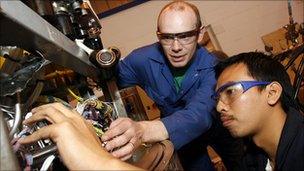Foreign investment in Scotland 'at 15-year high'
- Published

Aker Solutions of Norway was among foreign firms to announce investment plans in Scotland last year
Scotland has attracted its highest level of foreign investment for 15 years, according to an annual survey.
Ernst and Young said the number of projects involving foreign direct investment (FDI) rose by 49% last year to 76.
This compared to a 3% rise in projects coming in to the UK as a whole.
However, the survey suggested the number, external of reported jobs created by foreign investors in Scotland fell by 18% to 4,867.
John Swinney: "We will have the economic levers to make Scotland an even more attractive place to invest in."
It found Scotland increased its market share of all UK FDI projects by almost 3.5%, to 10.9%.
Ernst and Young said the figures showed Scotland continued "to punch above its weight" in an increasingly competitive global market.
Manufacturing operations accounted for more than 30% of FDI projects in Scotland, while the sector accounted for only 17% of projects generated in the UK as a whole.
The United States remained the largest source of FDI for the Scottish economy, accounting for 41% of all investment projects into the country.
But the report said while Scotland had also been successful in securing French, Norwegian and Swedish investment, it had not kept pace with the rest of the UK in attracting investment from emerging economies.
However, Finance Secretary John Swinney said there had been "sustained contact" with emerging markets.
He added that deals were "very close" to being finalised following a visit he had made last month to Japan and Korea.
The report also found Scotland's market share of UK-wide FDI employment fell by 4% to 16% in 2012, but it remained above the 13.7% average recorded over the past 10 years.
Ernst and Young Scotland senior partner Jim Bishop said the fall in job numbers took place against the backdrop of a modest increase in FDI-generated jobs in the UK as a whole.
"Only a large, one-off automotive project in the north west of England prevented Scotland retaining its position as the UK's top FDI job creator for the third year running," he said.
"There is much to be positive about but Scotland cannot rest on its laurels.
"We are still more reliant on the US as a long-standing lead investor than the rest of the UK but lagging behind in investments from growing economies such as India and China.
"The country is performing well, but there's always room for improvement."
The report also argued the current debate surrounding Scotland's constitutional future was having "little or no effect" on levels of FDI.
It said: "There's certainly no sign of investors being deterred from coming to Scotland; if anything, the reverse appears to be true."
Mr Bishop added: "As new markets open up and competition for FDI intensifies, securing investment will become more difficult for all countries, including Scotland.
"However, next year's referendum hasn't acted as a barrier to investment so far, although that may change as the discussion intensifies."
Scottish Development International said the survey underlined the message to foreign investors that Scotland was "open and ready for business".
Chief executive Anne MacColl said: "Over the past 12 months, we've opened up six new offices in key locations such as Hyderabad, Calgary, Shenzhen and Rio de Janeiro and we'll soon be establishing a presence in West Africa.
"This will ensure that we continue our recent successes in attracting new jobs and investment for Scotland."
In an interview with Radio Scotland's Good Morning Scotland programme, Mr Swinney said: "For some years our opposition have been saying the independence campaign and referendum would undermine inward investment - that has been flatly contradicted.
"What we have demonstrated, and what the report very fairly sets out, is the role of our organisations, Scottish Development International, Scottish Enterprise and Highlands and Islands Enterprise, working with interested partners to create the right condition for them be attracted to Scotland."

French firm Chanel last year bought the Barrie Knitwear cashmere mill in the Scottish Borders
On the prospects of independence, Mr Swinney added: "We will have the economic levers to make Scotland an even more attractive place to invest in and that will be the focus of a government that has the health of the Scottish economy and the utilisation of the broad range of the economic levers we will acquire entirely at our disposal."
A Scotland Office spokesman said it was "always good to see Scotland doing well as part of the UK".
He added: "Investors look at the wider picture and this report shows the stability and opportunity offered by Scotland, with a single market and regulatory regime and using Sterling as part of the UK, is an attractive option for foreign companies.
"The real question is what would happen if those positive conditions were to change in the future."
- Published21 December 2012
- Published17 October 2012
- Published16 October 2012
- Published19 November 2012